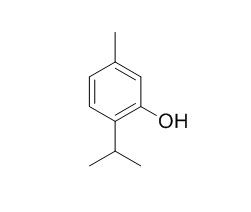Thymol
Thymol is a positive allosteric modulator of human GABAA receptors and a homo-oligomeric GABA receptor from Drosophila melanogaster, which has antioxidant, antimicrobial, anti-inflammatory, insecticidal and repellent properties. Thymol possesses anti-hepatotoxic activity, it prevents the CCl4-induced prolongation in pentobarbital sleeping time confirming hepatoprotectivity.Thymol has inhibitory effect on the release of human neutrophil elastase.
Inquire / Order:
manager@chemfaces.com
Technical Inquiries:
service@chemfaces.com
Tel:
+86-27-84237783
Fax:
+86-27-84254680
Address:
1 Building, No. 83, CheCheng Rd., Wuhan Economic and Technological Development Zone, Wuhan, Hubei 430056, PRC
Providing storage is as stated on the product vial and the vial is kept tightly sealed, the product can be stored for up to
24 months(2-8C).
Wherever possible, you should prepare and use solutions on the same day. However, if you need to make up stock solutions in advance, we recommend that you store the solution as aliquots in tightly sealed vials at -20C. Generally, these will be useable for up to two weeks. Before use, and prior to opening the vial we recommend that you allow your product to equilibrate to room temperature for at least 1 hour.
Need more advice on solubility, usage and handling? Please email to: service@chemfaces.com
The packaging of the product may have turned upside down during transportation, resulting in the natural compounds adhering to the neck or cap of the vial. take the vial out of its packaging and gently shake to let the compounds fall to the bottom of the vial. for liquid products, centrifuge at 200-500 RPM to gather the liquid at the bottom of the vial. try to avoid loss or contamination during handling.
Molecules.2023, 28(13):4971.
J Ethnopharmacol.2017, 206:327-336
Microbiol. Biotechnol. Lett.2022, 50(2): 193-201.
Biomed Pharmacother.2022, 156:113929.
Psychopharmacology (Berl).2020, 10.1007
Phytomedicine.2015, 22(14):1262-8
PLoS One.2018, 13(3):e0193386
J Ethnopharmacol.2017, 196:75-83
Research SPJ.2024, 0377.
J Ethnopharmacol.2021, 267:113615.
Related and Featured Products
Braz. J. Med. Biol. Res. 2007, 40(3): 349-56.
Antimicrobial activity of the essential oil from Lippia sidoides, carvacrol and thymol against oral pathogens.[Pubmed:
17334532]
Dental caries and periodontal disease are associated with oral pathogens. Several plant derivatives have been evaluated with respect to their antimicrobial effects against such pathogenic microorganisms. Lippia sidoides Cham (Verbenaceae), popularly known as "Alecrim-pimenta" is a typical shrub commonly found in the Northeast of Brazil. Many plant species belonging to the genus Lippia yield very fragrant essential oils of potential economic value which are used by the industry for the commercial production of perfumes, creams, lotions, and deodorants. Since the leaves of L. sidoides are also extensively used in popular medicine for the treatment of skin wounds and cuts, the objective of the present study was to evaluate the composition and antimicrobial activity of L. sidoides essential oil.
METHODS AND RESULTS:
The essential oil was obtained by hydro-distillation and analyzed by GC-MS. Twelve compounds were characterized, having as major constituents Thymol (56.7%) and carvacrol (16.7%). The antimicrobial activity of the oil and the major components was tested against cariogenic bacterial species of the genus Streptococcus as well as Candida albicans using the broth dilution and disk diffusion assays. The essential oil and its major components Thymol and carvacrol exhibited potent antimicrobial activity against the organisms tested with minimum inhibitory concentrations ranging from 0.625 to 10.0 mg/mL. The most sensitive microorganisms were C. albicans and Streptococcus mutans.
CONCLUSIONS:
The essential oil of L. sidoides and its major components exert promising antimicrobial effects against oral pathogens and suggest its likely usefulness to combat oral microbial growth.
Food Chem . 2016 Nov 1;210:402-14.
Antibacterial and antifungal activities of thymol: A brief review of the literature[Pubmed:
27211664]
Abstract
Thymol (2-isopropyl-5-methylphenol) is the main monoterpene phenol occurring in essential oils isolated from plants belonging to the Lamiaceae family (Thymus, Ocimum, Origanum, and Monarda genera), and other plants such as those belonging to the Verbenaceae, Scrophulariaceae, Ranunculaceae, and Apiaceae families. These essential oils are used in the food industry for their flavouring and preservative properties, in commercial mosquito repellent formulations for their natural repellent effect, in aromatherapy, and in traditional medicine for the treatment of headaches, coughs, and diarrhea. Many different activities of Thymol such as antioxidant, anti-inflammatory, local anaesthetic, antinociceptive, cicatrizing, antiseptic, and especially antibacterial and antifungal properties have been shown. This review aims to critically evaluate the available literature regarding the antibacterial and antifungal effects of Thymol.
Keywords: Antibacterial; Antifungal; Monoterpene; Thymol; Thymus.
Parasitol. Res., 2009, 105(2):507-12.
Insecticidal and repellent activities of thymol from the essential oil of Trachyspermum ammi (Linn) Sprague seeds against Anopheles stephensi.[Pubmed:
19343365 ]
Essential oil of seeds of Trachyspermum ammi (Linn.) Sprauge and its pure constituent Thymol showed promising results when evaluated for larvicidal, oviposition-deterrent, vapor toxicity, and repellent activity against malarial vector, Anopheles stephensi.
METHODS AND RESULTS:
Thymol was 1.6-fold more toxic than the oil toward fourth-instar larvae of A. stephensi with LD(50) values of 48.88 and 80.77 microg/ml, respectively. Egg laying by female adults of A. stephensi was much significantly reduced when exposed to vapors of Thymol compared to the oil of T. ammi seeds, and similar effects were recorded for subsequent egg hatching and larval survival. Vapor toxicity assay showed LC(50) value of 79.5 mg/mat for Thymol against adults of A. stephensi, whereas the crude oil exhibited the LC(50) value of 185.4 mg/mat. Thymol provided complete repellency toward A. stephensi adults at the dose of 25.0 mg/mat after 1 h duration, whereas same degree of repellency was obtained by the oil at the dose of 55.0 mg/mat, indicating its double-fold activity than the oil.



